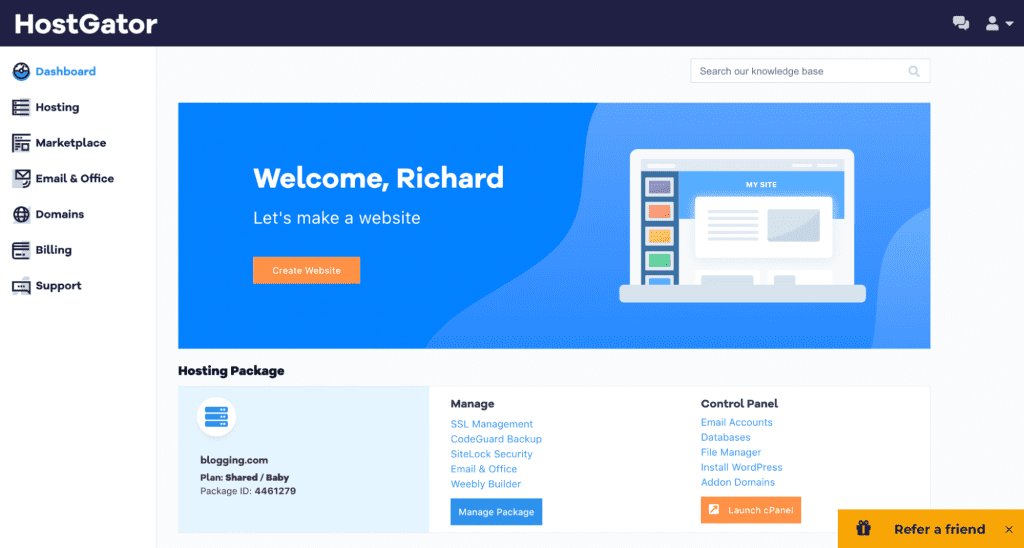| Review factor | Winner |
|---|---|
| Plans and pricing | HostGator (5.0) |
| Features | Tie: SiteGround (4.5) / HostGator (4.5) |
| Performance and uptime | HostGator (5.0) |
| Security | SiteGround (5.0) |
| Support | SiteGround (5.0) |
| Improvements | SiteGround (4.8) |
| Best overall | SiteGround (4.7) |
SiteGround vs. HostGator: Specs
| Password manager | Details | Basic plan features |
|---|---|---|
| SiteGround Overall rating: Read our full SiteGround review. | Starting price: $2.99 per month Hosting packages: Shared, WordPress, WooCommerce, Cloud |
|
| HostGator Overall rating: Read our full HostGator review. | Starting price: $2.75 per month Hosting packages: Shared, WordPress, VPS, Dedicated, Reseller |
|
SiteGround vs. HostGator: Plans and Pricing
Plans and pricing winner: HostGator | |
|---|---|
| SiteGround (4.5) | Starts at $2.99 per month |
| HostGator (5.0) | Starts at $2.75 per month |
HostGator and SiteGround are priced pretty similarly with introductory rates for their lowest priced plans set at just under $3 per month. While HostGator is clearly the cheaper of the two by almost a whole quarter, you’re getting a stellar deal with either hosting provider.
Of course, your monthly rate will increase once your introductory rate expires, so you’ll need to keep this in mind in either case. HostGator’s standard monthly rate is still only $7.99 per month for the Hatchling plan, while SiteGround’s StartUp plan is almost double at $14.99.
I’d argue that SiteGround is still worth it, even at that monthly price point, but if saving money is your highest aim, it’s hard to do better than HostGator.
Winner: For both the long term and the short term, HostGator is the better option if you want to save money.
Features
Features winner: Draw | |
|---|---|
| SiteGround (4.5) |
|
| HostGator (4.5) |
|
SiteGround and HostGator are similar in that they have reasonable pricing, offer discounts for signing a contract and have over 99% uptime. With both, you can expect to pay more if you pay month-to-month, and each offers money-back guarantees. HostGator has many plans designed to accommodate your site as it grows and even has a dedicated server plan. SiteGround offers three tiers designed to support up to an average of 400,000 page views per month. Once you exceed that amount, you’ll need a more robust plan.
SiteGround provides 10 GB of storage with its base plan, whereas HostGator’s storage is 50 GB. The maximum storage on SiteGround’s plans is 40 GB, whereas HostGator has unlimited storage with its shared hosting plans.
While I personally feel that HostGator has stronger features than SiteGround (especially for hosting novices), it’s honestly too close to call. Both providers are feature-rich, and there are valid reasons to choose either. In the end, I’m calling this one a draw.
Performance and Uptime
Performance and uptime winner: HostGator | |
|---|---|
| SiteGround (4.8) | 99.9% uptime guarantee |
| HostGator (5.0) | 99.9% uptime guarantee |
It’s hard to beat HostGator’s uptime record — 99.99% over the long term, which is exceptionally good. While there have been some recent dips which drag that average down marginally, its overall stability is excellent. If you host your website on HostGator, you can be assured that your site will run consistently.
SiteGround is no slouch either, with an average uptime of 99.989% over the past 30 days, which is impressive in its own right. It’s also fairly speedy — When I ran the tests on SiteGround, the average response time was an extremely impressive 622ms. This is just a measurement of how quickly the servers respond to a request, though, so do your best to create your site in a way that ensures it can load quickly.
It’s another close match, but I think that HostGator wins on the strength of its uptime and excellent track record. Siteground is certainly nipping at its heels, though.
Winner: HostGator has some of the best long-term uptime stability in the industry, though it better not rest on its laurels — SiteGround is gaining ground.
Security
Security winner: SiteGround | |
|---|---|
| SiteGround (5.0) |
|
| HostGator (4.5) |
|
Without a doubt, SiteGround and HostGator have strong security features. SiteGround offers free SSL certificates and automatic daily backups. HostGator also offers free SSL certificates and automatic backups.
However, I was particularly pleased with some of the more advanced security features that SiteGround offers. It uses a combination of live human monitoring and various security tools to ensure its servers and your website are as safe as possible. All servers use the latest PHP version 7 with the latest security fixes, and SiteGround uses systems to block bots and attackers.
Meanwhile, HostGator includes Redundant Array of Independent Disks or RAID-1 in its shared, reseller, and dedicated hosting plans. This service mirrors your data on two or more disk drives, ensuring you have a copy of your site somewhere at all times. While this is a welcome feature, I still have to give the victory to SiteGround for offering more active security measures.
Winner: SiteGround has more ways of keeping your website (and the data on it) safe.
Support
Support winner: SiteGround | |
|---|---|
| SiteGround (5.0) |
|
| HostGator (4.5) |
|
Both SiteGround and HostGator offer 24/7 customer support via phone, email, and live chat. SiteGround also offers a knowledge base and tutorials to help customers troubleshoot issues independently. HostGator offers a similar knowledge base and video tutorials.
However, while HostGator’s support quality is strong, wait times can be long. This wasn’t a problem I had with SiteGround. Its customer support team is staffed 24/7 and seems genuinely interested in ensuring you have a good experience. Every time I contacted the team via live chat or phone, it wasn’t long before they had a solution for me.
Between two good options, SiteGround is just a little better — and that makes all the difference here.
Winner: When you have a problem, SiteGround gets you up and running again in no time and earns this victory fair and square.
Recent Improvements
Improvements winner: SiteGround | |
|---|---|
| SiteGround (4.8) |
|
| Hostgator (4.5) |
|
It is clear that SiteGround and HostGator are consistently updating and improving services, including adding features, adding data center facilities, and providing more services. However, yet again SiteGround has the upper hand, with a host of generally more impressive features.
HostGator has improved its website builder and customer portal in addition to adding Cloudflare as a CDN, but that doesn’t really compare to SiteGround, which has added a whole new data center in Spain and created its own custom Content Delivery Network. There are big, impressive additions that make a victor here a no-brainer.
Winner: SiteGround takes bigger risks and earns bigger rewards.
Should You Get SiteGround or HostGator?
Bottom line winner: SiteGround | |
|---|---|
| SiteGround (4.7) |
Best for: E-commerce website owners, those who run personal websites, local and regional small businesses, and hobby or enthusiast website builders |
| HostGator (4.7) |
Best for: Great for anyone, ranging from beginners to large businesses |
While this was a pretty good match up between two giants of the industry, I have to award the final win to SiteGround. HostGator put up a good fight, but ultimately it couldn’t go the distance, knocked out in security, improvements, and support. It’s faster, offers more security features than just the basics, including a real-time monitoring system, artificial intelligence (AI) antibot system and free daily backups. Its customer support is top notch, efficient and helpful according to both customer reviews and my own first-hand experience.
That said, HostGator is still a great service which may better suit your needs — particularly if you’re primarily concerned by its impact on your wallet. There’s no denying that HostGator is the cheaper option and that, honestly, may be the only recommendation you need.
How We Evaluated SiteGround vs. HostGator
I test web hosts based on the following factors:
Learn more about our review methodology.


